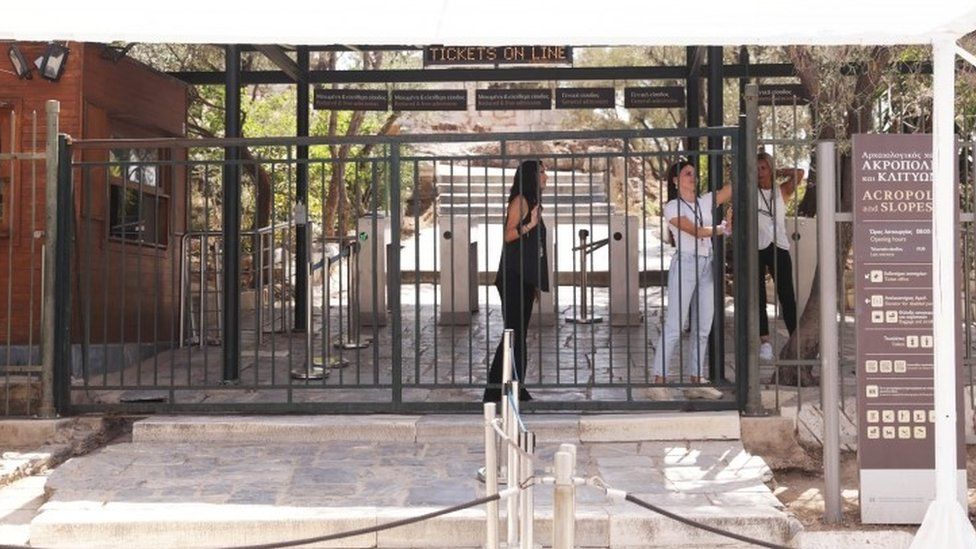ARTICLE AD BOX
 Image source, Reuters
Image source, Reuters
Greece's authorities closed the Acropolis till 5pm
By Robert Greenall
BBC News
The Acropolis in the Greek capital Athens has been closed during the hottest hours of the day to protect visitors from an intense heatwave gripping the country.
Tourists have been barred from entering the country's most popular attraction from 12:00 to 17:00 (9:00-14:00 GMT).
Athens is sweltering in temperatures of 40C (104F) or more.
Much of southern Europe is experiencing extreme heat with potentially record temperatures expected next week.
There are also fears in Greece of a greater risk of wildfires, especially in areas with high winds. It suffered major wildfires in 2021 in another exceptional heatwave.
In Croatia, fires broke out on Thursday, burning houses and cars in at least one village, Grebastica, on the Dalmatian coast. Officials told Croatian TV on Friday morning that the fire had been brought under control.
Earlier this week, a man in his forties died from the heat after collapsing in northern Italy - while several visitors to the country have collapsed from heatstroke, including a British man outside the Colosseum in Rome.
The cause is the Cerberus heatwave - named by the Italian Meteorological Society after the three-headed monster that features in Dante's Inferno.
It was expected to peak on Friday but Italian weather forecasters are warning that the next heatwave - dubbed Charon after the ferryman who delivered souls into the underworld in Greek mythology - will push temperatures back up above 40C next week.
Heatwaves are also being seen in parts of the US, China, North Africa and Japan.
Image source, Reuters
Image caption,Volunteers from the Hellenic Red Cross hand out water bottles
Image source, Getty Images
Image caption,Italy is one of the countries experiencing soaring temperatures
Greece's Culture Ministry announced the closure of the Acropolis on Friday, saying similar measures could follow on Saturday.
Temperatures were expected to peak at 41C in central Athens by midday on Friday, but the Acropolis sits on a rocky hilltop and is usually hotter.
There is little shade on the hill for respite.
The site is usually open from 08:00 to 20:00. Several other tourist sites around the Sacred Rock where the Acropolis stands will remain open throughout the day.
In recent days the Greek Red Cross has been deployed to provide water bottles and help people feeling nauseous and dizzy in the heat.
People have been advised to drink at least two litres of water a day and to avoid coffee and alcohol, which are dehydrating.
Last month was the hottest June on record, according to the EU's climate monitoring service Copernicus.
Extreme weather resulting from warming climate is "unfortunately becoming the new normal", the World Meteorological Organisation (WMO) has warned.
Periods of intense heat occur within natural weather patterns, but that globally they are becoming more frequent, more intense and are lasting longer due to global warming.

 1 year ago
37
1 year ago
37








 English (US)
English (US)